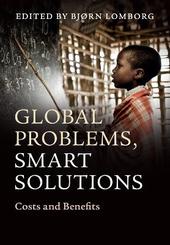
|
Global Problems, Smart Solutions: Costs and Benefits
Paperback / softback
Main Details
| Title |
Global Problems, Smart Solutions: Costs and Benefits
|
| Authors and Contributors |
Edited by Bjorn Lomborg
|
| Physical Properties |
| Format:Paperback / softback | | Pages:760 | | Dimensions(mm): Height 246,Width 174 |
|
| Category/Genre | Development economics
Environmental economics
Political economy |
|---|
| ISBN/Barcode |
9781107612211
|
| Classifications | Dewey:338.927 |
|---|
| Audience | | Professional & Vocational | |
|---|
| Illustrations |
172 Tables, black and white; 48 Halftones, unspecified; 62 Line drawings, unspecified
|
|
Publishing Details |
| Publisher |
Cambridge University Press
|
| Imprint |
Cambridge University Press
|
| Publication Date |
14 November 2013 |
| Publication Country |
United Kingdom
|
Description
Every four years since 2004, the Copenhagen Consensus Center has organized and hosted a high profile thought experiment about how a hypothetical extra $75 billion of development assistance money might best be spent to solve twelve of the major crises facing the world today. Collated in this specially commissioned book, a group of more than 50 experts make their cases for investment, discussing how to combat problems ranging from armed conflicts, corruption and trade barriers, to natural disasters, hunger, education and climate change. For each case, 'Alternative Perspectives' are also included to provide a critique and make other suggestions for investment. In addition, a panel of senior economists, including four Nobel Laureates, rank the attractiveness of each policy proposal in terms of its anticipated cost-benefit ratio. This thought-provoking book opens up debate, encouraging readers to come up with their own rankings and decide which solutions are smarter than others.
Author Biography
Bjorn Lomborg is Director of the Copenhagen Consensus Center and Adjunct Professor in the Department of Management, Politics and Philosophy at Copenhagen Business School. He is the author of the controversial bestseller, The Skeptical Environmentalist (Cambridge University Press, 2001) and was named one of the 'top 100 global thinkers' by Foreign Policy magazine in 2010 and 2011, one of the world's '100 most influential people' by Time and one of the '50 people who could save the planet' by The Guardian.
ReviewsPraise for the Copenhagen Consensus 2004-2013: 'I have served on four Copenhagen Consensus committees of experts since 2004. All involved hard choices among attractive alternatives to meet crucial objectives for development and health. And the reason I keep serving? I learn so much.' Thomas C. Schelling, Distinguished University Professor Emeritus of Economics, University of Maryland, and Nobel Laureate in Economics Praise for the Copenhagen Consensus 2004-2013: 'The Copenhagen Consensus brings together an impressive roster of minds, and while not everyone agrees with the composition and ordering of Lomborg's priorities lists - climate change tends to rank lower than many stakeholders would like, for example - as a point of departure for discussion, the exercise of priority-setting is a sound one.' Tom Zeller, Jr, The Huffington Post Praise for the Copenhagen Consensus 2004-2013: '[The] Copenhagen Consensus is an outstanding, visionary idea and deserves global coverage.' The Economist Praise for the Copenhagen Consensus 2004-2013: 'The selection of zinc supplements by the Copenhagen Consensus as the top global remedy for hunger and malnutrition was one of the main drivers for our $3 million initiative 'Zinc Saves Kids' with UNICEF. We are now expanding this effort to help the 450,000 kids at risk of dying every year, working with the United Nations Foundation, the Gates Foundation and others.' Stephen R. Wilkinson, Executive Director, International Zinc Association Praise for the Copenhagen Consensus 2004-2013: 'One of the greatest leadership skills discussed in the Global Leadership Forum in Washington DC (October 2012) was the Copenhagen Consensus simulation. This activity was very important because it gave us the opportunity to work together on a key leadership skill: building consensus around difficult issues.' Naglaa Hassab, Humphrey Fellow, MBA student in Economic Development, Finance and Banking, Egypt
|